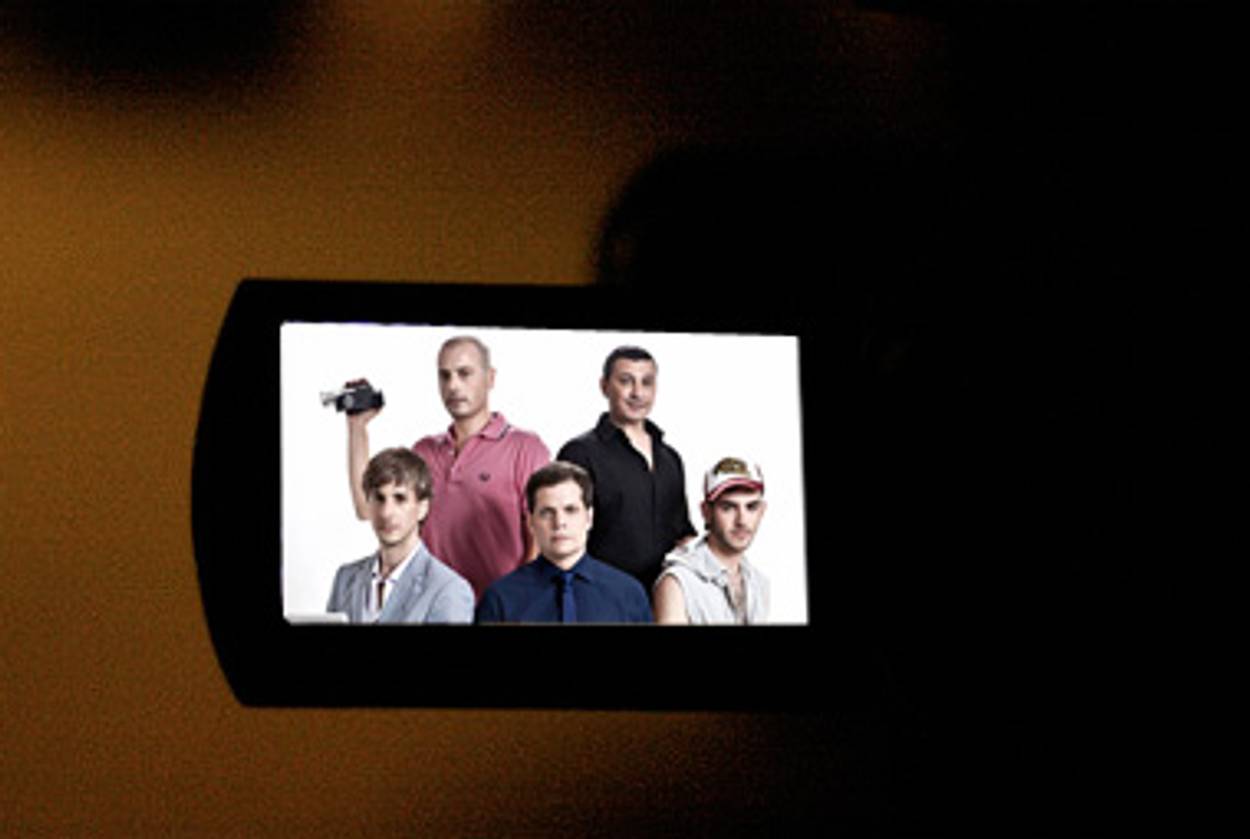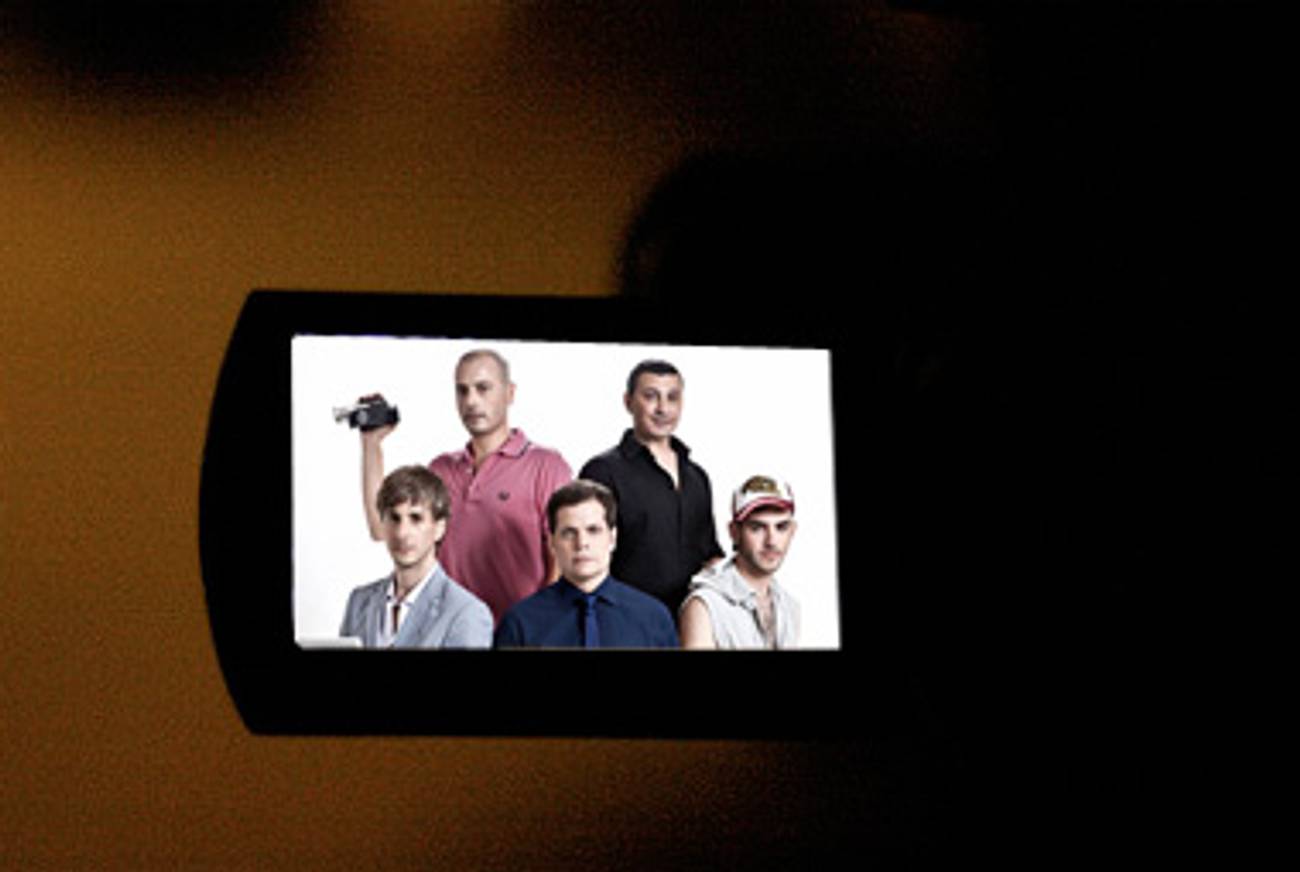Real World
A hit Israeli reality-TV show makes something smart, layered, and truthful from a genre’s usual mush




When he was newly divorced from his first wife, my brother moved into a small apartment near the Tel Aviv Central Bus Station. Emotionally shattered, he didn’t even bother to hook up the gas and limited his cooking to the jurisdictional domain of the electric kettle and microwave oven. It was in that grungy apartment that my brother began to develop the cooking style that, over the years, became known in our family as “junk-food gourmet.” When I went to see him, he would line up all of the kitchen’s edible items on the counter and from that potpourri, which consisted mainly of instant noodles, frozen dinners, and cartons of packaged milk, he would put together a meal for us. One that I remember most fondly was an instant spaghetti-and-mushroom dinner to which he added hot milk instead boiling water and even took the trouble to beef it up with grated Parmesan he’d found somewhere in the recesses of the fridge. Those meals weren’t the best I’ve ever eaten, but they gave us great satisfaction, because we realized that, considering the revolting processed foods we’d started out with, we had reached the pinnacle of culinary achievement, the Everest of junk food, and planted our flag. Those were not just ordinary meals but a triumph of the human spirit over monosodium glutamate.
Watching the Israeli reality TV series Connected, I can’t help recalling those sumptuous meals in my brother’s hole-in-the-wall kitchen. On paper, Connected looks like just another reality show for commercial TV, but the nearly megalomaniacal artistic ambitions of its exploding-with-talent creators and participants have produced something different. They have managed to take the shallow mush doled out by standard reality shows, and, while not eliminating the mush, they have placed it in a much more complex, clever, and reflexive concept. Similar to the food in my brother’s kitchen, I can’t claim that it’s the best television I’ve ever tasted, but it is definitely a unique blend of reality TV—in my view, the most insincere and artificial television genre there is—and a genuine, impressive attempt by the creators and participants to offer up some kind of truth, not only about themselves, but about humanity in general.
The show’s concept is far from original: Five participants document their lives by filming and narrating with the utmost honesty the most intimate events they experience. In Connected’s second season, the men are between the ages of 18 and 45. The show has been a smash hit not only because of the participants’ impressive storytelling abilities and their off-beat stories but because they, unlike in other shows such as Survivor and Big Brother, live in their natural surroundings and not in an isolated environment, and because the episodes are aired almost immediately after they’re filmed. This creates multilayered reflexivity, a sort of rich, sometimes nauseating layer cake of reality in which the participants in each episode have already seen the previous installment—and reacted to it.
Connected’s creators, Doron Tsabari and Ram Landes, are somewhat atypical to the Israeli television scene. Tsabari is one of the country’s most gifted and crusading makers of social documentaries. His last film, Guide to Revolution, is a brilliant record of his uncompromising, years-long fight against the politicization of Israeli public television. Landes was, for years, the editor of commercial television’s major nightly news broadcast, until he left to create a soap opera called Hasufim (“Exposed”), about TV news shows and their manipulative methods. If there is a common denominator in the work of these two essentially different, creative people, it is that they both deal with the same issue: the exploitative use of television and the possibility of striving for truth within the medium’s limitations.
Four out of the five subjects the creators hired for this season of Connected are no strangers to media exposure. Shai Golden, a 40-year-old former TV critic, is the editor of the weekly magazine supplement to Haaretz; Ron Sarig, also 40, writes the most successful sitcom in Israel, Ramzor (“Stop Light”); Dudu Busi, 45, who flirted with the medium in the past as an actor, is an established and well-respected writer; and Ishai Green is a 30-year-old tech whiz who retired with millions at 25 only to discover two years later that he’d spent all his money. He has now put together a thriving new startup. In Andy Warhol terms, those four have already had their 15 minutes of fame. They are very savvy, atypical reality stars.
Watching the program, you have a strong sense that the five documenters feel they are engaged in a sacred mission. Their need to be honest and open seems almost pathological.
This pathology seems heightened by the show’s immediacy. Because the episodes have such a quick turnaround, it is possible to see one of the participants lie his way out of a family dinner only to hear, in the next episode, his mother’s reaction when her friends called to tell her that they saw her son lying on TV. In another episode, the participants and their wives and girlfriends reacted to viewers who commented online about their relationship. The fact that hundreds of people plead online for Ishai, the broke tech millionaire, to leave his wife develops into a marital crisis, when the wife accuses Ishai of putting her in a bad light in his self-documentary. In another surprising moment, the sitcom writer’s mother confesses that although she is suffering because of the show and the exposure, it has also caused her son, hungry for a bit of conflict and drama in his drab life, to visit her more often.
The show’s intervention in the lives of the characters can have a curative effect as well. The youngest participant in the show, Louis Edry, 18, who has a difficult relationship with his father, uses the camera to drag his dad into soul-searching conversations. In one such conversation, which would probably not have occurred under other circumstances, Louis realizes that he has never really understood his father’s ambitions for him. This discovery brings about a reconciliation and a significant change in their lives. On the other hand, Ron uses the camera in a selfish and aggressive manner, to confess how frustrated he is in his marriage and, later, to make the viewers privy to his infidelity, which of course leads to the painful destruction of the marriage.
And so this extreme reflexivity creates the effect of an Escher painting. Sometimes the painting is the hand painting itself and sometimes, as in Ron’s case, of the snake swallowing its tail. At any rate, the very narcissistic and disturbing result is also touching and poignant, reflecting the creators’ boundless ambition to leave a piece of raw, bleeding honesty on the viewer’s plate.
Translated by Sondra Silverston
Etgar Keret is a Tel Aviv-based filmmaker and fiction writer. He writes a regular column from Israel for Tablet.
Etgar Keret is a Tel Aviv-based filmmaker and fiction writer.